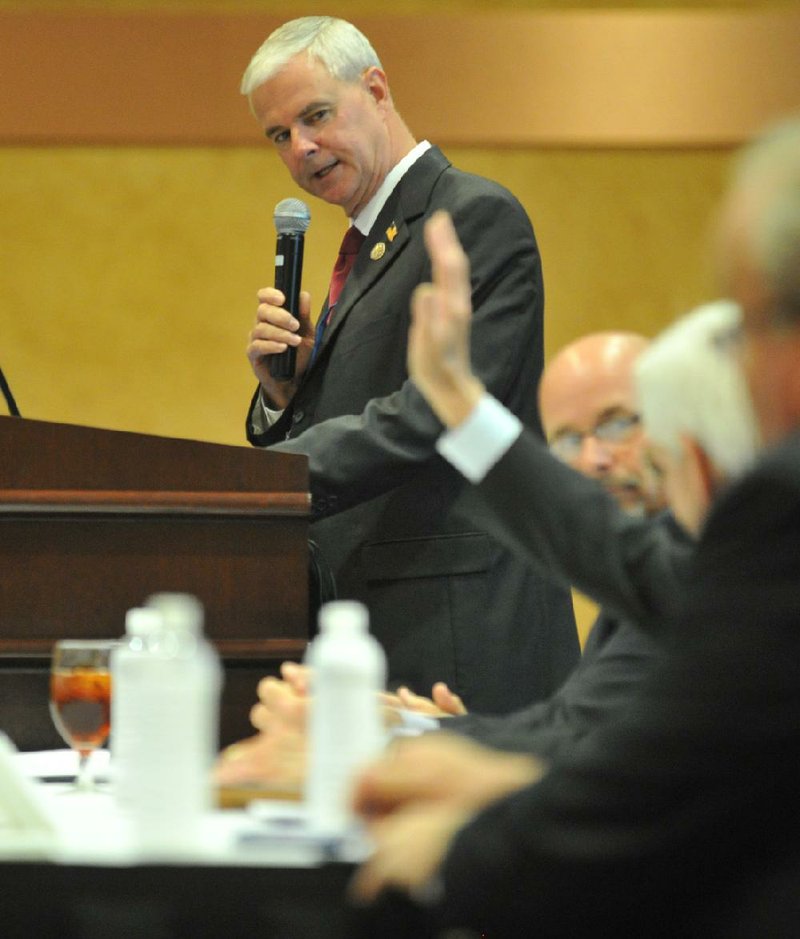WEST SILOAM SPRINGS, Okla. — Collaboration is more effective than regulation in watershed protection efforts, speakers said Thursday at the inaugural 4-State Watershed Academy.
“We are indeed making progress, but it is because of partnerships,” state Rep. Uvalde Lindsey, D-Fayetteville, said during a panel discussion of planners and lawmakers from Arkansas, Kansas, Missouri and Oklahoma.
Organized by the Illinois River Watershed Partnership, the two-day academy focused on water quality and watershed management. Organizers expected 200 people to attend the event held at the Cherokee Casino and Hotel’s conference center, including representatives from federally recognized Indian tribes, state government agencies, cities counties and watershed organizations.
Lindsey on Thursday said states have come a long way since the 1980s when Oklahoma and Fayetteville were tangled in a lawsuit over discharges from the city’s sewer plant. The battle went to the U.S. Supreme Court as Oklahoma challenged Fayetteville’s plan to shift part of its sewer plant discharge into the Illinois River. Until then, the discharge went into the White River, which feeds Beaver Lake, Northwest Arkansas’ main drinking water supply.
The quality of water flowing through the 99-mile Illinois River has long been a source of disagreement for Arkansas and Oklahoma officials.
In 2005, Oklahoma suedSpringdale-based Tyson Foods Inc. and five other poultry companies, claiming they polluted the Illinois River watershed with poultry manure. The suit claims the practice of spreading bird manure on fields as fertilizer within the Illinois River watershed in both Oklahoma and Arkansas caused unhealthy amounts of phosphorus in the river.
U.S. District Judge Greg Frizzell of Tulsa has not ruled in the case, although closing arguments were presented in February 2010.
U.S. Rep. Steve Womack, R-Rogers, on Thursday said he is concerned about the economic implications of Oklahoma’s phosphorus limit of 0.037 milligrams per liter in the Illinois River.
Womack said cities in Northwest Arkansas have spent a combined $300 million on sewer improvementprojects that have greatly reduced phosphorous in the Illinois River, but he called Oklahoma’s limit “somewhat unrealistic.”
“As member of Congress, I want an attainable and scientifically supported water quality standard,” Womack said.
Oklahoma is reviewing its phosphorus standard of 0.037 milligrams and must complete that process by 2012.
Al Armendariz, administrator of the federal Environmental Protection Agency’s Region 6 in Dallas, said it’s important to collect enough accurate scientific data in making watershed management decisions.
“If people of good will are presented with good data, they get over [their arguments],” Armendariz said Thursday.
Delia Haak, executive director of the Illinois River Watershed Partnership, said the academy was geared at addressing the challenges faced in protecting watersheds. She said it’s important to understand why watershed management plans are important to the long-term health of lakes and streams.
“We organized this event to bring together the best and brightest minds to consider not just their own watershed,but those of their neighbors,” Haak said in a news release. “By working together and recognizing that watersheds don’t recognize state boundaries, we can do more to protect our rivers, lakes and streams.”
Gov. Mike Beebe, who attended Thursday’s event, praised the efforts of agencies and representatives participating in the conference and encouraged them to continue striving to maintain the spirit of cooperation.
“Whatever is going to happen tomorrow is going to require further cooperation,” Beebe said.
Northwest Arkansas, Pages 11 on 09/30/2011

